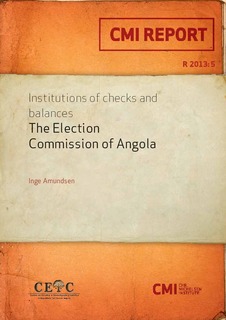| dc.contributor.author | Amundsen, Inge | |
| dc.date.accessioned | 2018-01-04T08:20:56Z | |
| dc.date.available | 2018-01-04T08:20:56Z | |
| dc.date.issued | 2013-08-01 | |
| dc.identifier | oai:www.cmi.no:4890 | |
| dc.identifier.citation | Bergen: Chr. Michelsen Institute (CMI Report R 2013:5) 34 p. | |
| dc.identifier.isbn | 978-82-8062-472-7 | |
| dc.identifier.issn | 0805-505X | |
| dc.identifier.uri | http://hdl.handle.net/11250/2475155 | |
| dc.description.abstract | This report focuses on one particular institution which may mitigate the centralisation of power in Angola and pave the way for political reform and democratisation; the Angolan national electoral commission (the Comissão Nacional Eleitoral, CNE). The study outlines the types and role of governmental electoral management bodies (EMBs), positions the CNE in a comparative historical perspective, and analyses the CNE’s mandate and independence in terms of legal autonomy, nomination of leaders/commissioners, and financial autonomy. It is argued that the CNE is in constitutional and legal terms a genuinely independent commission, with a comparatively broad mandate and powers. However, due to the political context of Angola it remains to be seen if this formal autonomy will be translated into a counter-balancing institution to the centralised Angolan government. | |
| dc.language.iso | eng | |
| dc.publisher | Chr. Michelsen Institute | |
| dc.relation | CMI Report | |
| dc.relation | R 2013:5 | |
| dc.relation.ispartof | CMI Report | |
| dc.relation.ispartofseries | CMI Report R 2013:5 | |
| dc.relation.uri | https://www.cmi.no/publications/4890-institutions-of-checks-and-balances | |
| dc.subject | Election Commission | |
| dc.subject | Angola | |
| dc.title | Institutions of checks and balances: The Election Commission of Angola | |
| dc.type | Research report | |
| dc.identifier.cristin | 1082134 | |
